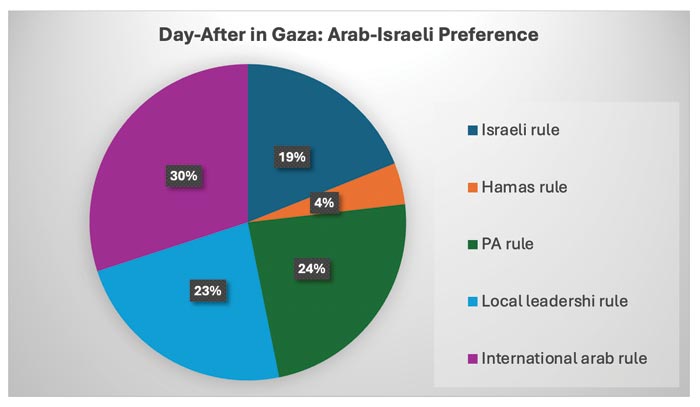 People walk at the Carmel Market after Iran’s overnight drone and missile attack on Israel on April 14, 2024 in Tel Aviv (Amir Levy/Getty Images)
People walk at the Carmel Market after Iran’s overnight drone and missile attack on Israel on April 14, 2024 in Tel Aviv (Amir Levy/Getty Images) The exact wording of Prime Minister Benjamin Netanyahu’s tweet was slightly different from the title of this article. “We intercepted, we prevented, together we will win.” All three parts of this tweet are not completely accurate. We intercepted – yes, but not alone. Other countries assisted. We prevented – not exactly, there was an attack, there was some damage, the Iranians were not deterred. “Together we will win” is an issue for another occasion. We can talk about “together” and about “we will win.” But for now, let’s just talk briefly about what happened between Israel and Iran.
We can open with the following statement: Iran has more or less achieved its objective. By attacking Israel with drones and missiles it exacted a price for the assassination of a senior general in Syria, without entangling itself – and I should be cautious as I write on Tuesday – in a dangerous war. Was Iran expecting this high rate of interception and this low number of victims and this small level of damage to Israel? Probably not. So the Iranians might be somewhat disappointed. Still, generally speaking, the Iranians wanted to do the following:
A. To draw a red line that says “whoever assassinates our officials will have to take into account a counterattack.”
B. To send a message of determination: “Even if the whole world warns against it, we will still attack.”
C. To do all this without getting overly involved at war with Israel, and certainly not with the U.S.
How does one achieve such a goal? By doing what the Iranians did. They announced the attack in advance; they launched a massive, but not too massive, attack; they targeted places where one would not expect a vast number of casualties. They gave the enemy’s intelligence enough advance warning, and the enemy’s defense systems a lot of time to prepare.
Were the Iranians hoping to see more damage done? Maybe. Probably. The attack provided them with a good opportunity to test their ability to penetrate Israel’s shield, from which they would learn quite a bit.
Were the Iranians hoping to see more damage done? Maybe. Probably. The attack provided them with a good opportunity to test their ability to penetrate Israel’s shield, from which they would learn quite a bit. They tested their offensive capabilities against an Israeli defense combined with international aid, and will now study the outcome to better prepare for a next time. They will look at the drones and missiles that were torpedoed, those that were able to go through, the tools Israel used. There is a lot for them – and for Israel – to learn. So, you could think about the attack as a sort of dress rehearsal, a large-scale hot exercise.
And no – I do not mean to say that the attack should be taken lightly. It was dangerous and troubling. Because of that, it is important for Israel not to overstate its supposed “win.” True, Biden called it a “win.” But we know why: He wanted to convince Netanyahu not to respond to the attack.
It was not a win but was also not a loss. Israel has also more or less achieved its goal. It killed an Iranian general, and dealt with the counterattack successfully. The regional and international alliances worked, the defense system excelled. As a result, decision makers retained flexibility as they determined whether to counterattack. If Iran were to destroy important infrastructure facilities, Israel would be forced to respond. If there had been a large number of casualties, Israel would have had to respond. The Iranians did not want to force Israel to respond. They wanted Israel to have flexibility. They wanted the Americans to be able to say to Israel something along the lines of “nothing has happened that requires a response that would drag the entire region into a storm of war.”
Must Israel respond? This is a difficult question. A sovereign country cannot calmly accept a widespread attack on its territory without reacting. But the attack is a reaction to something Israel (supposedly) did. And this isn’t a precedent — Israel was attacked and did not respond in the first Gulf War. And in retrospect, that decision seems reasonable and perhaps even wise, although there were those who doubted it at the time. Also, Israel is busy on several fronts; that should be taken into account. There are the Americans, who do not want Israel to respond. And there are economic considerations; one attack cost Israel a lot of money. Additional attacks would cost more.
And we haven’t finished mentioning all the considerations. So, the decision whether and how to respond to the attack is complex. And anyone who thinks there is an unequivocal and clear answer to it, probably hasn’t thought it through.
One thing is clear: The day-before warnings seem excessive in retrospect, and the day-after celebrations were also excessive in retrospect. On Sunday, Israel behaved as if it has just won some important battle. But that’s not the case, and we better remember that it wasn’t a win, because the illusion of victory can be almost as dangerous as losing. Israel has absorbed an attack, and it is not certain that it will have the ability to respond decisively. Israel celebrated its great defense and great defense is important. But as every sports coach would tell you, to win one must also have an effective offense.
Something I wrote in Hebrew
On Tuesday, I penned a short dictionary of Iran-attack cliches. Here’s one item:
“It was an unprecedented achievement” — this is a somewhat strange argument. Let’s think about it for a second and a half: in what sense is this an unprecedented achievement, in the sense that Israel has never intercepted so many missiles and drones at once? Obviously! This is because the enemy never sent so many missiles and drones at Israel at once. We’ll admit the truth: “An unprecedented achievement” is merely a rhetorical introduction to an operational recommendation: “Therefore Israel is not obliged to respond.”
A week’s numbers
JPPI’s monthly survey asked Arab Israelis about their preference for a Gaza day-after. Very few want Hamas rule to be reimplemented, and a plurality supports an international Arab force as the remedy for this troubled region.

A reader’s response:
Effi Azuri writes: “Bibi is becoming very unpopular in the U.S.” My response: He is unpopular in Israel too … but also still the PM.
Shmuel Rosner is senior political editor. For more analysis of Israeli and international politics, visit Rosner’s Domain at jewishjournal.com/rosnersdomain.























 More news and opinions than at a Shabbat dinner, right in your inbox.
More news and opinions than at a Shabbat dinner, right in your inbox.